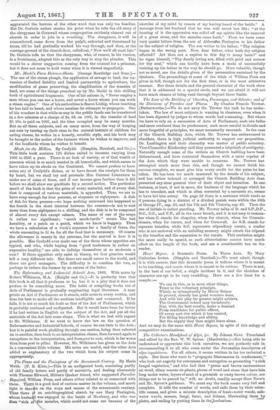The Law of the Building of Churches, Parsonages, and Schools;
and of Divisions of Parishes and Places. By Charles Francis Trower. (Butterworths.)—We do not envy Mr. Trower the task he has under- taken. The law of most subjects is wanting in clearness, even when it has been digested by judges to whom words had a meaning. But where- we have to rely on a succession of Acts of Parliament, eaoh one fuller and more confused than its predecessor, each more careful in details an& more forgetful of principles, we must necessarily succumb. In the me- et the Church Building Acts, which Mr. Trower has endeavoured to elucidate, there is high judicial authority to support our proposition. Dr. Lnshington said their obscurity was matter of public notoriety.. Vice-Chancellor Kindersley said they presented a labyrinth of ambiguity. Naturally enough some of the writers on Church building have been disheartened, and have contented themselves with a mere reprint of the Acts which they were unable to construe. Mr. Trower has, attempted much more than this, and though we cannot think his. success complete, we must give him every credit for the pains he has. taken. He has been too much mastered by the details of his subject, and has rather indexed or arranged the Church Building Acts than presented any clear general view of their object and intention. In ones instance, at least, if not in more, the haziness of the language which he. has to translate, and, which is often corrected by a sarcastic sic, seems. to have led him astray. On page 52 there is a sentence which reads as- if persons dying in a district of a divided parish were within the 10th of George IV., cap. 50, and the 7th and 8th Victoria, cap. 65. Then the use of initials is rather puzzling. Mr. Trower talks -of D. and
D.C., C.C., and N.P., all in the same breath, and it is not easy to remem- ber when C. stands for chapelry, when for church, when for Commis- sioners, when for curate, and when for Cornwall. As S.B. stands for separate benefice, while S.C. represents stipendiary curate, a reader who is not endowed with an unfailing memory might attach the stipend to the benefice and the separation to the curate. This contortion might the more easily be spared, as such abbreviations cannot have much effect on the length of the book, and are a considerable tax on the- reader.






























 Previous page
Previous page